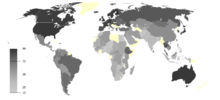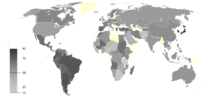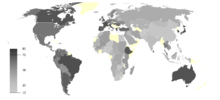- Climate change opinion by country
-
For more about opinion in general, see Public opinion on climate change.Proportion reporting "something" or a "great deal" about global warming. Darker areas indicate a greater proportion of individuals aware, yellow indicates no data.Proportion responding yes when asked, "Temperature rise is part of global warming or climate change. Do you think rising temperatures are [...] a result of human activities?"
Climate change opinion is the aggregate of public opinion held by the adult population. Cost constraints often restrict surveys to sample only one or two countries from each continent or focus on only one region. Because of differences among questions, wording, and methods—it is difficult to reliably compare results or to generalize them to opinions held world-wide.
In 2007–2008, the Gallup Poll surveyed individuals from 128 countries in the first comprehensive study of global opinions. Gallup aggregated opinion from the adult population fifteen years of age and older, either through the telephone or personal interviews, and in both rural and urban areas except in areas where the safety of interviewer was threatened and in scarcely populated islands. Personal interviews were stratified by population size or geography and cluster sampling was achieved through one or more stages. Although error bounds vary, they are all below ±6% with 95% confidence.
Weighting countries to a 2008 World Bank population estimate, sixty-one percent of individuals world-wide are aware of global warming, developed countries more aware than developing, with Africa the least aware. Latin America and developed countries in Asia lead the belief that climate change is a result of human activities while Africa, parts of Asia and the Middle East, and a few countries from the Former Soviet Union lead in the opposite. Awareness often translates to concern, although of those aware, individuals Europe and develop countries in Asia perceive global warming as a greater threat than others.
- Awareness
- Knowing "something" or a "great deal" about global warming when asked "How much do you know about global warming or climate change?"
- Caused by human activity
- Responding yes when asked, "Temperature rise is part of global warming or climate change. Do you think rising temperatures are [...] a result of human activities?"
- Perceived as threat
- Responding that global warming is a serious personal threat.
Country Awareness Caused by
human activityPerceived
as threat Afghanistan
Afghanistan25 29 18  Algeria
Algeria56 54 46  Angola
Angola43 70 38  Argentina
Argentina76 81 71  Armenia
Armenia78 28 65  Australia
Australia97 54 75  Austria
Austria95 51 54  Azerbaijan
Azerbaijan58 42 43  Bangladesh
Bangladesh33 62 32  Belarus
Belarus80 48 30  Belgium
Belgium89 50 68  Belize
Belize53 59 45  Benin
Benin21 46 15  Bolivia
Bolivia55 73 51  Botswana
Botswana38 26 30  Brazil
Brazil79 80 76  Burkina Faso
Burkina Faso36 52 34  Burundi
Burundi22 38 20  Cambodia
Cambodia58 34 51  Cameroon
Cameroon49 52 32  Canada
Canada95 61 74  Central African Republic
Central African Republic56 58 37  Chad
Chad45 31 38  Chile
Chile73 78 69  China
China62 58 21  Colombia
Colombia68 77 65  Costa Rica
Costa Rica75 87 72  Czech Republic
Czech Republic87 52 39  Democratic Republic of the Congo
Democratic Republic of the Congo53 52 41  Denmark
Denmark90 49 40  Djibouti
Djibouti43 62 35  Dominican Republic
Dominican Republic50 52 46  Ecuador
Ecuador70 81 69  Egypt
Egypt25 60 21  El Salvador
El Salvador55 75 51  Estonia
Estonia88 46 32  Ethiopia
Ethiopia80 56 73  Finland
Finland98 53 39  France
France93 63 75  Georgia
Georgia62 37 47  Germany
Germany96 59 60  Ghana
Ghana26 51 19  Greece
Greece87 84 82  Guatemala
Guatemala57 72 51  Guinea
Guinea55 40 43  Guyana
Guyana67 36 56  Haiti
Haiti46 38 35  Honduras
Honduras62 58 57  Hong Kong
Hong Kong93 78 54  Hungary
Hungary93 65 75  Iceland
Iceland95 38 33  India
India35 53 29  Indonesia
Indonesia39 55 33  Iran
Iran55 62 43  Iraq
Iraq55 38 28  Ireland
Ireland94 66 60  Israel
Israel86 63 62  Italy
Italy84 65 76  Japan
Japan99 91 80  Jordan
Jordan62 53 51  Kazakhstan
Kazakhstan60 54 35  Kenya
Kenya56 59 49  Kyrgyzstan
Kyrgyzstan52 42 39  Laos
Laos80 65 49  Latvia
Latvia91 54 37  Lebanon
Lebanon64 64 54  Liberia
Liberia15 41 13  Lithuania
Lithuania91 50 47  Luxembourg
Luxembourg95 60 75  Madagascar
Madagascar49 67 46  Malaysia
Malaysia71 63 50  Mali
Mali53 72 48  Malta
Malta75 68 64  Mauritania
Mauritania44 48 35  Mexico
Mexico67 71 63  Moldova
Moldova83 48 73  Mongolia
Mongolia75 54 30  Morocco
Morocco30 68 29  Mozambique
Mozambique54 53 48  Namibia
Namibia46 49 35  Nepal
Nepal37 48 32  Netherlands
Netherlands96 44 57  Nicaragua
Nicaragua53 66 49  Niger
Niger24 35 21  Nigeria
Nigeria28 27 18  Norway
Norway97 47 43  Pakistan
Pakistan34 25 24  Palestine
Palestine67 50 55  Panama
Panama65 73 61  Paraguay
Paraguay58 79 54  Peru
Peru62 72 58  Philippines
Philippines47 72 42  Poland
Poland84 58 54  Portugal
Portugal90 79 85  Qatar
Qatar64 39 43  Republic of the Congo
Republic of the Congo41 58 31  Romania
Romania81 60 66  Russia
Russia85 52 39  Rwanda
Rwanda30 44 22  Saudi Arabia
Saudi Arabia49 39 40  Senegal
Senegal36 27 33  Sierra Leone
Sierra Leone36 31 24  Singapore
Singapore84 44 59  South Africa
South Africa31 29 21  South Korea
South Korea93 92 80  Spain
Spain85 71 69  Sri Lanka
Sri Lanka73 63 65  Sudan
Sudan47 69 42  Sweden
Sweden96 64 56  Syria
Syria56 54 41  Taiwan
Taiwan91 70 70  Tajikistan
Tajikistan43 81 19  Tanzania
Tanzania53 15 48  Thailand
Thailand88 55 61  Togo
Togo29 43 23  Trinidad and Tobago
Trinidad and Tobago72 76 71  Tunisia
Tunisia60 50 46  Turkey
Turkey74 70 66  Uganda
Uganda35 66 30  Ukraine
Ukraine79 51 52  United Kingdom
United Kingdom97 48 69  United States
United States97 49 63  Uruguay
Uruguay73 75 68  Uzbekistan
Uzbekistan53 18 38  Venezuela
Venezuela63 65 62  Vietnam
Vietnam73 49 53  Zambia
Zambia27 43 18  Zimbabwe
Zimbabwe52 41 36 References
- Pelham, Brett (22 Apr 2009). "Awareness, Opinions About Global Warming Vary Worldwide". Gallup. http://www.gallup.com/poll/117772/Awareness-Opinions-Global-Warming-Vary-Worldwide.aspx. Retrieved 22 Dec 2009.
- Pugliese, Anita; Ray, Julie (22 Sep 2009). "A Heated Debate: Global Attitudes Toward Climate Change" (Subscription required). Harvard International Review. http://www.highbeam.com/doc/1G1-212873407.html. Retrieved 19 Jan 2010.
- Pugliese, Anita; Ray, Julie (7 Dec 2009). "Top-Emitting Countries Differ on Climate Change Threat". Gallup. http://www.gallup.com/poll/124595/Top-Emitting-Countries-Differ-Climate-Change-Threat.aspx. Retrieved 22 Dec 2009.
- Pugliese, Anita; Ray, Julie (11 Dec 2009). "Awareness of Climate Change and Threat Vary by Region". Gallup. http://www.gallup.com/poll/124652/Awareness-Climate-Change-Threat-Vary-Region.aspx. Retrieved 22 Dec 2009.
- World Development Indicators database (15 Sep 2009). "Population 2008". World Bank. http://siteresources.worldbank.org/DATASTATISTICS/Resources/POP.pdf. Retrieved 18 Jan 2010.
Categories:- Global warming
- Public opinion
- Climate change by country
Wikimedia Foundation. 2010.



